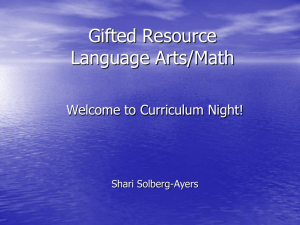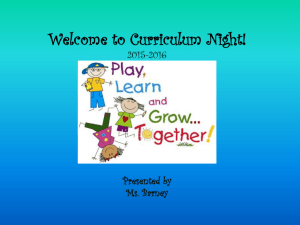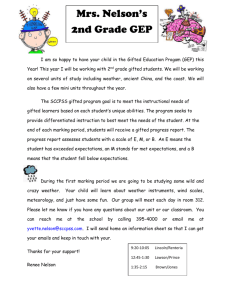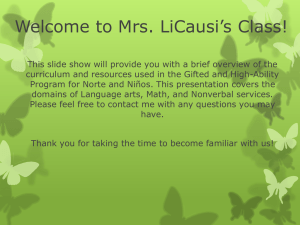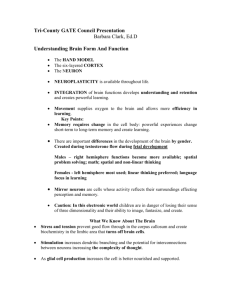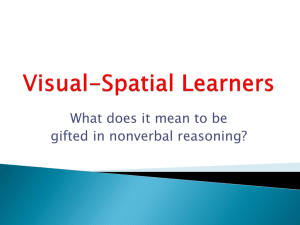Welcome to Curriculum Night!!!
advertisement
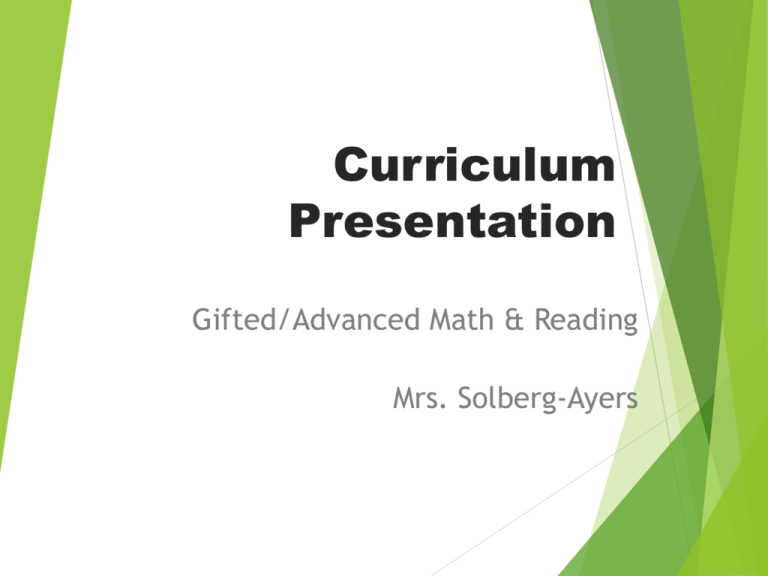
Curriculum Presentation Gifted/Advanced Math & Reading Mrs. Solberg-Ayers Mrs. Solberg-Ayers Teaching experience in CA, Arizona and Connecticut, Classrooms taught 2nd-5th grades, Gifted and SEI. Home state of California – Family of Teachers Masters in Elementary Education, emphasis in Multicultural Education from ASU Masters in Geographic Education, from ASU. Gifted Endorsement, K-8 Certification Family: Husband, two kids:20 & 18, one dog Love to travel, watch World Cup, learn languages, cook, hike in the mountains, run on the beach, write and read. Math • Daily warm-up, to build math communication skills • CGI (Cognitively Guided Instruction) – • Promotes flexible thinking • Students are challenged to find unique strategies • Students verbally explain strategies to classmates/teachers • Vocabulary, Vocabulary, Vocabulary!!! • Problem Solving • Engage New York, Investigations, Common Core sources • Thinking Maps • Games (24-Example, Logic Links, Make 7, Set), Hands-on Equations (For Algebra) • Technology-Games, Thinking Maps, Microsoft Word • Tests/Quizzes ! Homework • 15-30 minutes an evening • 3-4 nights a week • Wide variety of assignments • • Projects are a possibility from time to time Students should write homework in their planner every night. Literary Responses • • • • • What is a Literary Response? The little voice in your head that talks to you, things you observed, feelings you had while reading. Locus of control is with students not teacher It’s natural and enjoyable, encourages interaction with text, active reading. Students write on sticky notes, transfer on to paper, turn questions in: complete sentences and paragraphs. Use Self Evaluations, asking questions such as “Did I complete reading on time? Did I write On the Lines, Between the Lines, Beyond the Lines?” GR program is about the last two. Kinds of Responses: Practicing Process Skills Questions you had while reading • Predictions • Words you didn’t understand and what you think it might mean (with page number) • Words or phrases you liked and why • Quotes with page numbers, what you think it meant. • Use the author’s name when making observations (I really like how Oscar Wilde said…) • Write about the moral, or theme in one response. • If it’s from the heart; there’s no wrong response. • Reading Expectations Students must do the reading and write their responses. They cannot participate if they don’t. Responses must be done neatly, with sentences written correctly, hand written with pencil or typed. Papers should have proper headings. They will always have 2-4 days to complete reading and responses. Vocabulary Development WordSmith Vocabulary development Greek and Latin stems Master List : 2 – 3 year word cell list Instead of just prefixes, roots and suffixes. This gets at the meaning of those parts or cells. (Hyphen placement is important to meaning). E.g., Tele- (from afar) Vis (see) -Ion( -ing, act) WordSmith (Continued) Flash Cards – Great way to study Possible projects – creativity can come out, practice presentation skills. Word-’O, Jeopardy – Review games we’ll play. Spelling comes from daily writing. Parents: Quiz using flashcards, practice at home on words, ask about progress. Wordly Wise – Vocabulary and Comprehension • Booster shot for vocabulary development • Help students meet state standards for vocabulary and reading comprehension • Emphasizes learning from context • Uses prefixes, suffixes, roots • Uses graphic organizers and semantic maps • Practice with dictionary skills, pronunciation, parts of speech. Writing Daily writing • Writing journal • Teacher directed lessons on reading topics • Note-taking • Poetry • Stories • Grammar lessons • Lessons pulled from Literature or text books • Projects High Interest Research Historical connection to classwork Science/Math related to lessons Poetry Others Research project on topic of personal interest. Homework 20-30 minutes a night 3-4 times a week Assignment Calendar, filled out daily Not prepared/missing assignments – Parents notified. Nonverbal Students work in their classrooms for nonverbal. Children placed in gifted for nonverbal reasoning typically enjoy: •Taking things apart and perhaps …putting them back together •Building things (Legos or blocks) •Paper crafts (origami, paper airplanes, Rube Goldberg books, etc. •Puzzles (jigsaw or Rush Hour type) •Technology! Home-School Communication Conferences are two times per year to review progress and set goals Voice mail/phone (may take 24 hours to return, email is faster) Check grades on Genesis Email questions anytime: ssolbe@kyrene.org Gifted Wish List Colored highlighters Crayons, colored pencils Colored gel pens Pretty colored paper for publishing poems Sticky notes in different colors Large Baggies for books College ruled writing paper, copy paper ¼” graph paper Index cards Clear sheet protectors for 3 ring binders Schedule of Classes MATH: 12:25-1:55, M, T, TH, F Wed: 9:45-10:45 Reading: 11:25-11:55 5th 11:55-12:25 4th M, T, Th, F Mariposa is implementing a school-wide PBIS program What is PBIS? Positive Behavior Intervention System Focuses on positive rewards for good behavior Creates a plan for “teaching” appropriate student behaviors Creates a plan to address undesirable student behaviors through teacher and administrative interventions Lesson plans build on Mariposa Life Skills Consistency throughout the school All staff expectations are the same, using the same language and the same series of rewards and consequences BLAST Be Respectful Lead with Integrity Act Responsible Safety Matters Together We Achieve School Store coupons (Blast Coupons) Miss Manner certificates (Blast Coupons) Principal’s Lunch guest Lifeskills (all Lifeskills are imbedded in BLAST) Looking forward to working with you and your child. Thank you! Mrs. Solberg-Ayers ssolbe@kyrene.org
